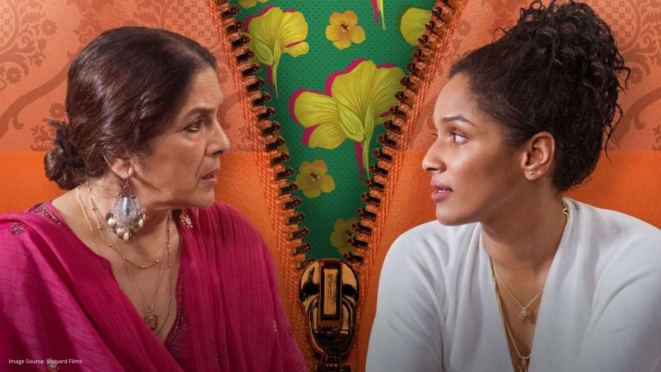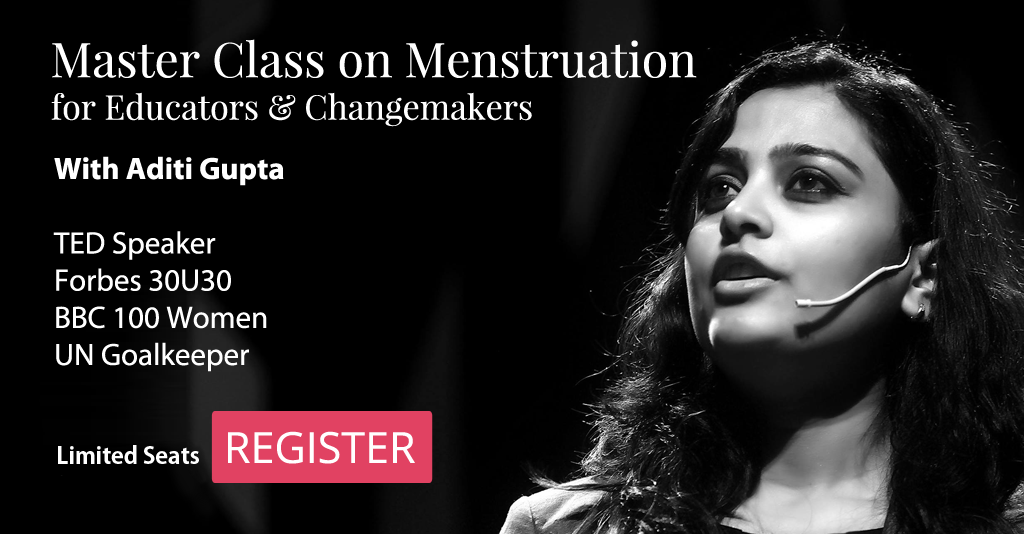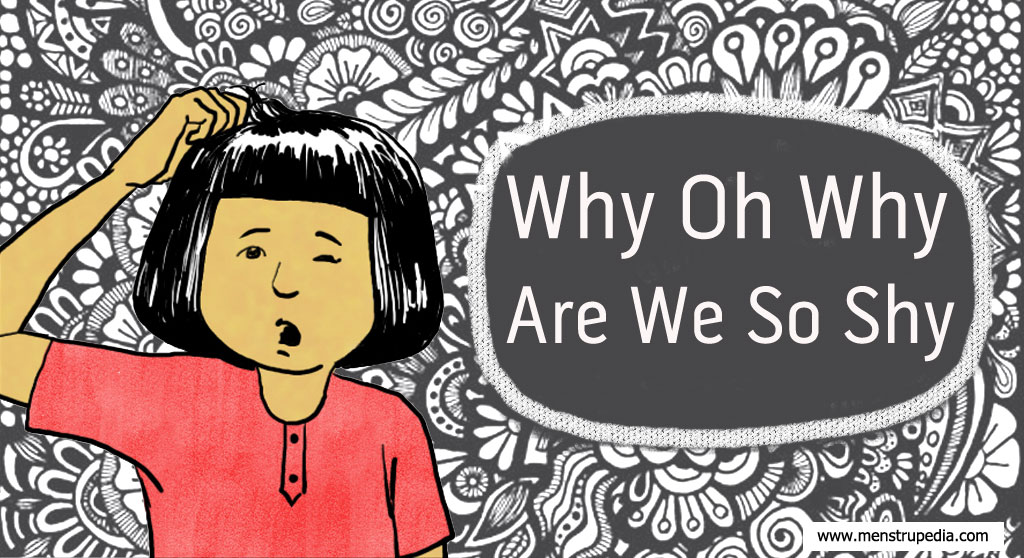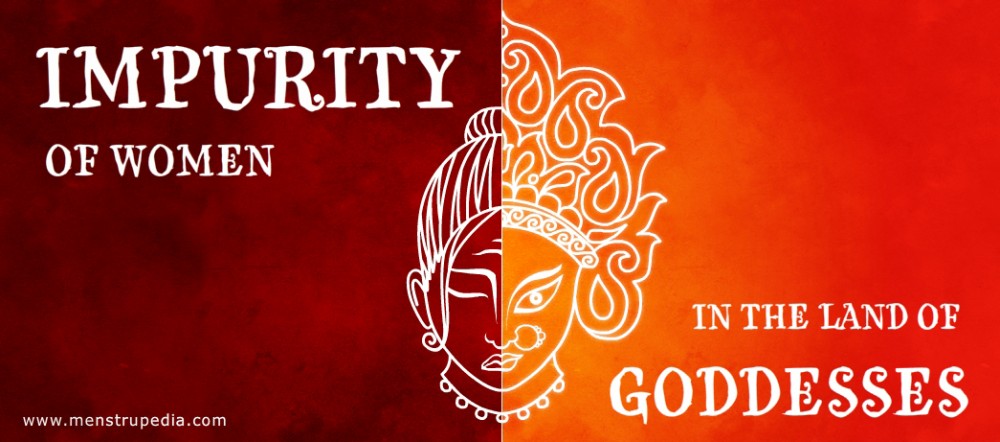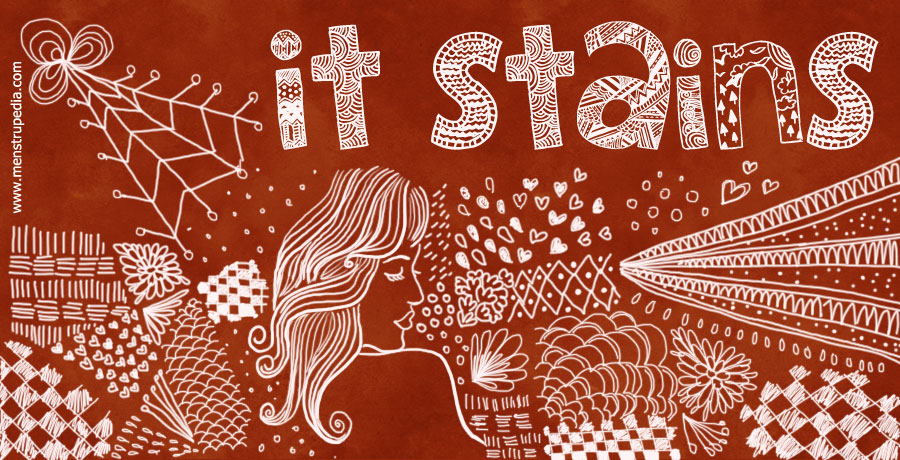I came across information about a session that was being conducted by Menstrupedia to normalize period talks between parents and children and I was instantly so ashamed because I couldn’t even share it with my parents and other relatives for the simple reason that till today, I haven’t been able to talk to my own mother about it without being awkward and shy. This is exactly the reason I am writing this because till the time I can become a mother and have this conversation with my children, there will be thousands of people who will start menstruating and they should know that they aren’t alone.
It’s been more than ten years now since I got my first period. It was February 2010 and I was in the fifth grade. I went to the washroom in between classes and found brown stains on my underwear. I was 12 then, and completely ignorant of the concept of menstruation and periods and blood and uteruses so I mistook the stains for poop and dismissed them. But it happened the next day again and on the third day, my mother came to know about it and realized it wasn’t poop but probably dried blood. She asked me if I was bleeding and I got scared and said no. I thought I probably had some serious disease. This went on for a few months because I never had proper blood flow, so I never had to use a pad. But I wasn’t even told that I was menstruating for almost six months and I still wonder why. Sometimes it makes me very angry at my mother because she didn’t talk to me about it. Yet, she had told my friends’ moms about it; it’s a thing I believe, to share your daughter’s first period story among your friends. It was my friend who came to me to tell me that she was angry with me for not telling her that I had started my period and that’s when she explained to me about what was happening in my body. Everyone at school was getting their period at that time and I remember never being able to fully understand and participate in those conversations with my friends. I felt isolated. I was anxious, awkward, confused, and extremely shy to even talk about it with my mom. I remember my dad explaining it to me once as to why it happened because I got scared seeing blood on my underwear. I wish he had done it more and in a much more uninhibited manner. My mother however never uttered the word ‘period’ in front of me and when I saw Menstrupedia’s hashtag #ItsJustAPeriod, I so wished it had come earlier to me.

Since I did not start bleeding the usual normal way, my mom took me to a few doctors who said irregular periods are normal initially and they would regularize over time as I grew older. When that did not happen, we went to a few more doctors, and then I was diagnosed with Polycystic Ovarian Disease (PCOD). I now know what PCOD/PCOS (polycystic ovarian syndrome) means but back then I had no idea. I was put on meds that were like oral contraceptive pills. Ultrasounds and blood tests became a normal thing every year. I would have proper periods while on medications and when I stopped them, my cycles would go haywire. It was an extremely uncomfortable experience. I would not have track of when I would have my cycle, when they would end, whether they would be heavy or light or spotting, how long they would go on for, nothing. I have had days when I would have spotting and dry bleeding for almost a month and then go for 5-6 months without bleeding and sometimes would even bleed for twice a month. It became difficult to attend school in this condition or for that matter to go anywhere. I would always keep calculating days in my mind and look at the calendar whenever we would plan a trip, just praying that I didn’t get my period then. I would get uncomfortable while visiting someplace for the fear of staining, afraid that people would ask me about it. What made me more uncomfortable was the fact that I realized how my mom had told most of her friends and relatives about it. I couldn’t think of facing those people.
This went on for almost 6-7 years and gradually the frequency of my cycles started decreasing. I started getting periods for maybe 4-5 times a year with medications. I had probably consulted more doctors for this than any other illness of mine. We tried everything, starting from homeopathy, allopathy to even Ayurveda. But nothing provided a permanent solution. Some doctors told me to lose weight, to exercise; some said that it would be cured once I conceived. But no one could properly explain what PCOD/PCOS was, why it happened, how it can be better regulated, and if it could be cured at all. I started having severe acne problems, facial hair, hair on unusual parts like on my lower stomach just below my belly button, my chest, and on my breasts. My face is so oily that I can never put anything on it. In the last one and a half years, I have had severe hair loss. My hair is a very important part of me and my pride and when I started losing it, it had a huge impact on my self-esteem. It was equivalent to losing strands of confidence. I sometimes hated my face because I couldn’t look at the mirror without seeing it filled with spots and acne. I would envy my friends who had clear skin. To add to all of this, I got tired of having to take pills every now and then.
When I look back now, I cannot believe I had to go through such uncomfortable times completely alone. I never shared these thoughts with anyone because back then, people wouldn’t talk about periods as openly as we do now. I cannot believe that this happened with someone like me coming from an urban and well-educated family and it scares me to even think about those people who don’t even have the education and awareness that we have.
I switched to a healthier diet from last year (gave up my favorite desserts, junk items) after I learned that PCOD/PCOS is a lifestyle disorder and can be better regulated with proper dietary habits and maintaining a good lifestyle. I stopped taking meds from this year because all meds have some sort of side effects. Moreover, it isn’t a sustainable way to live on meds forever if you can help it.
A friend of mine suggested that I try out some exercises (easily available on the internet) specifically aimed at irregular periods, and they have worked like magic. I came across many people with PCOD/PCOS in college and that’s when I realized that it’s very common nowadays (almost 1 in every 4 women have it) and I can stop feeling weird and awkward about it. However, things get a bit complicated when you have PCOD/PCOS because I don’t know when I will have my next cycle, and I am sometimes confused about whether my mood swings are due to pre-menstrual symptoms (PMS) or me being upset and cranky for some other issue. I have heard pregnancy scares are real for people with PCOD who are sexually active. I also don’t know sometimes whether I am losing hair due to stress or PCOS and whether I am unable to fall asleep because of PCOS or some other issue.
I consider myself unfortunate to not have received the correct information at the right time because of the taboo associated with periods in our culture. We are taught to say that ‘we are sick’ whenever we are on our period and I grew up learning that I am ‘impure’ on the first three days and only after I had cut my nails and washed my hair would I be considered clean. I gave up these habits as I started living alone, but not entirely. Certain things become too deeply ingrained in you to be given up so easily. However, we must, with all our resources and capacities, try not to inculcate these in the minds of future generations and I want to take the first step in this direction through my story. I do not want any other person to go through the difficult time and confusion that I went through. I do not want the taboo and stigma associated with menstruation to come in the way of an individual’s self-esteem and force them to hide their face in shame. There’s nothing shameful about getting your period and even not getting it, but there should be nothing to stop you from receiving the right information and awareness about it. Because after all, #ItsJustAPeriod!
Author: Sayani Saha

Sayani is a budding psychologist who is pursuing her Masters in Applied Psychology (Clinical and Counseling Practice) from the Tata Institute of Social Sciences, Mumbai. Mental health is as important to her as is Army to the BTS (you guessed it right – she is a huge fan of the boy band from Korea!). She loves to dance and sing and struggles to teach people how to pronounce her name correctly, so if you haven’t got it right, it’s ‘Sha-yo-ni!’
Edited by: Divya Rosaline


